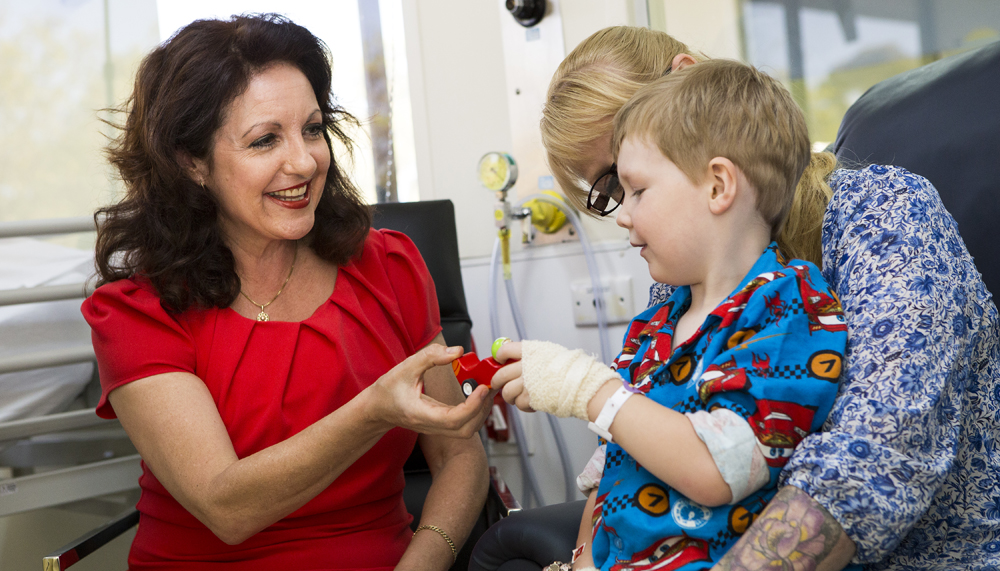
Sue Peter, who found her life’s calling in pediatrics, defines leadership in her field.
Thirty-three years ago, Sue Peter, director for clinical commissioning for the Perth Children’s Hospital project, walked into a pediatric ward during her adult-based nursing training.
Instantly, she knew this was what she wanted to do with her career – where she wanted to be.
“It provided the synergy between my passion for nursing and my commitment to children’s healthcare,” she says. “Pediatric nursing offers so much scope and versatility, and working alongside children and their families is, and continues to be, a privilege.”
Peter was named Western Australia’s 2013 Nurse of the Year, after first winning the Research or Innovative Practice category. The award acknowledged her outstanding contribution to the profession in the state.
WA Health Minister Kim Hames said at the time, “Sue’s exemplary dedication to education and research set a high standard for the profession, and she has consistently demonstrated her strong leadership and unwavering commitment to improving outcomes in pediatric care.”
Nursing Review spoke to Peter about scooping the state’s top award, as well as the passion that has kept her in the sector for more than three decades.
What do you love most about working in this specialty?
Pediatrics enables nurses to develop and fine-tune their health assessment skills, as children cannot always articulate their healthcare needs and the signs of severe illness can be subtle.
Pediatric nursing affords an opportunity to interact with patients at a point in time that can make a difference and affect healthcare for the rest of their lifespan. It offers diversity throughout the stages of child development, age ranges and childhood conditions and provides the opportunity to work in a holistic way that involves the whole family.
In my role, I work with great teams that are committed and passionate about providing the best care for children and families in the home environment. Leading teams and supporting their growth and development to provide services for those who need it most has been rewarding for so many reasons. Together we share ideas for innovative care provision and work to remove barriers to healthcare by formulating plans and challenging tradition and convention. In the teams I work with, we always ask the question, ‘Why not?’ and work towards improvement that is responsive to the needs of patients and families, and that is extremely rewarding.
What are the biggest changes to the sector you have seen throughout your career?
Healthcare is ever changing, however, the acuity and complexity in paediatrics – children with high care needs – is pushing the boundaries of acute care out into the community. Ambulatory care models are increasingly required to provide tertiary care out of the hospital and have changed our idea of the traditional hospital. Research and education continues to push this frontier out and, personally, this is the area that I feel compelled to champion.
What are the biggest challenges those working in pediatrics today face?
One of the biggest challenges as a health system is meeting the needs of vulnerable groups that, in the past, have been overlooked by the system as they are often in the ‘Too Hard Basket’ for a multitude of reasons. These groups include children with complex care needs, who often have disabilities and are medically fragile, rural and remote families, and indigenous populations. Access to services for these cohorts requires new and innovative approaches, although the shifting of models from traditional health services to those that are responsive and provide alternatives to hospital care is challenging. The increase in mental health morbidities in adolescents and young people poses a significant challenge for society as a whole and the need for improved transition from pediatric to adult care remains a key imperative.
What does your current role entail?
Within my substantive position as nursing director for ambulatory care services, I incorporate a strong research and evaluation focus to support the development, implementation and evaluation of new, innovative clinical service delivery models that enable children to be cared for in alternative settings to hospitals. Underpinning this process with evaluation and research has resulted in the successful procurement and sustainability of ambulatory care services that provide improved outcomes for children and are preferred by families.
Nurses need to work collaboratively with academics and clinicians to lead the development of responsive health service delivery models ensuring education, research, evaluation and quality processes are embedded into clinical practice and focused on patient outcomes. We also have responsibility to present research findings at state and national conferences and publish widely to share successes with other jurisdictions.
Why is leadership so important to you, and who from the profession has inspired you throughout your career?
Leadership to me is about questioning the traditional delivery of care and seeking opportunities to improve it. At a strategic level it is not just about envisaging a new service, but also about how we engage stakeholders and secure funding and staff to implement and sustain that service. It is about identifying people’s abilities and potential in new roles and the ability to challenge staff to take on new tasks and positions. This is embodied in a quote from one of the ambulatory care nurses: “I was made to believe we can achieve things that we never thought we could do ourselves.”
Leadership is not just within the remit of senior nurses; nurses at all levels can be leaders in patient care. The clinical interface is where leadership and front line accountability has most impact on patient safety and family outcomes and their healthcare experiences. I think I was fortunate to be inspired by many great mentors along the way who instilled within me the courage to advocate and question. However, the people who inspire me the most are the families who deal with a high burden of disease on a daily basis and the nursing teams that empower and support children and their families with compassion and commitment.
How did you feel when honoured with the 2013 award?
I was shocked (Which was why I did not prepare a speech!) and humbled but extremely proud and honoured to represent pediatric nursing, particularly as the timing coincides with the building of the new Perth Children’s Hospital, where I am very excited to be working as director for clinical commissioning.
Email: [email protected]




